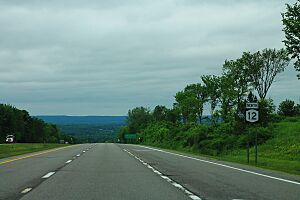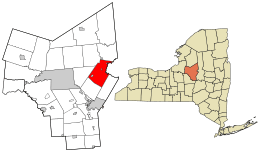Trenton, New York facts for kids
Quick facts for kids
Trenton, New York
|
|
|---|---|

Northbound NY 12 in Trenton
|
|

Location in Oneida County and the state of New York.
|
|
| Country | United States |
| State | New York |
| County | Oneida |
| Government | |
| • Type | Town Council |
| Area | |
| • Total | 43.72 sq mi (113.23 km2) |
| • Land | 43.38 sq mi (112.34 km2) |
| • Water | 0.34 sq mi (0.88 km2) |
| Elevation | 817 ft (249 m) |
| Population
(2020)
|
|
| • Total | 4,297 |
| • Density | 99.06/sq mi (38.25/km2) |
| Time zone | UTC-5 (Eastern (EST)) |
| • Summer (DST) | UTC-4 (EDT) |
| FIPS code | 36-75280 |
| GNIS feature ID | 0979556 |
Trenton is a town in Oneida County, New York, United States. The Haudenosaunee people called it Ose-te-a-da-que, which means "in the bone." In 2020, about 4,297 people lived there.
Contents
History of Trenton, New York
The first settlement in Trenton was started in 1793. A man named Gerrit Boon helped set it up in a place called Barneveldt. He was working for a company called the Holland Land Company. This company helped sell land in new areas.
After a few years, Boon went back to Holland. Another Dutch person, Adam Gerard Mappa, took over. Later, Mappa's friend Francis Adrian Vanderkemp also moved to Barneveld.
The town of Trenton was officially created in 1797. It was formed from a part of the Town of Schuyler. Some people think the town was named Trenton because local soldiers fought in the Battle of Trenton during the American Revolutionary War. The town includes land from two old land grants, the Holland and Servis Patents.
In 2005, the Wethersfield Stone Schoolhouse was added to the National Register of Historic Places. This means it's an important historical building.
Geography and Nature
Trenton is a town with a total area of about 43.7 square miles (113.2 square kilometers). Most of this area, about 43.4 square miles (112.3 square kilometers), is land. The rest, about 0.3 square miles (0.88 square kilometers), is water.
The West Canada Creek forms the eastern edge of the town. This creek also marks the border with Herkimer County.
The town of Trenton also gave its name to a type of rock called the "Trenton Group." This is a kind of limestone that can be found in many places, even as far away as Minnesota.
People and Population
Trenton has seen its population change over the years. Here's how many people have lived in the town at different times:
| Historical population | |||
|---|---|---|---|
| Census | Pop. | %± | |
| 1800 | 624 | — | |
| 1810 | 1,548 | 148.1% | |
| 1820 | 2,617 | 69.1% | |
| 1830 | 3,221 | 23.1% | |
| 1840 | 3,178 | −1.3% | |
| 1850 | 3,540 | 11.4% | |
| 1860 | 3,504 | −1.0% | |
| 1870 | 3,156 | −9.9% | |
| 1880 | 3,097 | −1.9% | |
| 1890 | 2,709 | −12.5% | |
| 1900 | 2,628 | −3.0% | |
| 1910 | 2,402 | −8.6% | |
| 1920 | 2,389 | −0.5% | |
| 1930 | 2,262 | −5.3% | |
| 1940 | 2,295 | 1.5% | |
| 1950 | 2,522 | 9.9% | |
| 1960 | 3,417 | 35.5% | |
| 1970 | 4,429 | 29.6% | |
| 1980 | 4,683 | 5.7% | |
| 1990 | 4,682 | 0.0% | |
| 2000 | 4,670 | −0.3% | |
| 2010 | 4,498 | −3.7% | |
| 2020 | 4,297 | −4.5% | |
| U.S. Decennial Census | |||
In 2000, there were 4,670 people living in Trenton. These people lived in 1,776 households, and 1,287 of these were families. The town had about 107.8 people per square mile.
Most people in Trenton were White (98.07%). A small number were African American (0.39%), Native American (0.06%), or Asian (0.54%). Some people were from other backgrounds or had mixed backgrounds. About 0.34% of the population was Hispanic or Latino.
Many households (35.6%) had children under 18 living with them. Most households (58.5%) were married couples. About 22.9% of households were single people living alone.
The average age in Trenton in 2000 was 39 years old. About 27.0% of the people were under 18. About 12.5% were 65 years or older.
The average income for a household in Trenton was $49,559. For families, the average income was $56,377. A small number of families (2.6%) and people (5.9%) had lower incomes, including some children and older adults.
Communities and Places in Trenton
Trenton is home to several smaller communities and interesting locations:
- Barneveld – This small community is in the middle-eastern part of the town. It is located west of Trenton Falls.
- Barneveld Station – You can find this spot south of Barneveld, along NY 12.
- Fox Hill – This is a raised area (an elevation) located north-northeast of Barneveld.
- Hinckley – This community is on NY 365. It is near the Hinckley Reservoir, which is on the north side of West Canada Creek.
- Holland Patent – This village is in the southwestern part of the town, also on NY 365.
- Mapledale – This location is south of Barneveld.
- Prospect – This community is in the very northeastern corner of the town.
- South Trenton – This area is located off NY 12, close to the southern border of the town with Deerfield.
- Steuben Valley – This community is right on the western edge of the town.
- Trenton Falls – This is a beautiful waterfall and a small community. It is on the eastern border of the town, along West Canada Creek.
- Trenton Falls Station – This location is found west of Trenton Falls.
Famous People from Trenton
Some notable people have come from Trenton:
- John Waldo Douglas (1818–1883) – He was a Presbyterian minister who was born in Trenton.
- Hal Schumacher (1910–1993) – He was a professional baseball player. He played for the New York Giants.
- Daniel H. Wells (1814–1891) – He was a politician and a religious leader who was born in Trenton.
See also
 In Spanish: Trenton (Nueva York) para niños
In Spanish: Trenton (Nueva York) para niños

